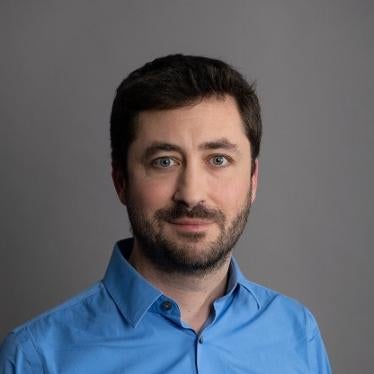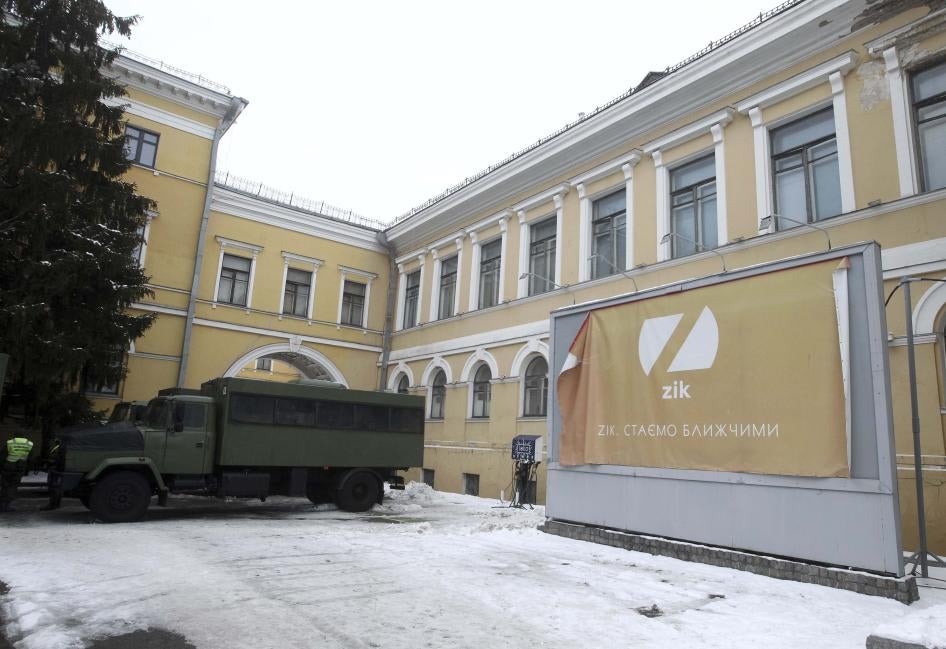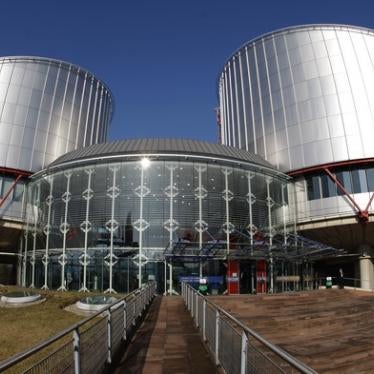In times of armed conflict, governments will be routinely challenged on what limits on human rights they deem necessary and what standards they will preserve. Fighting disinformation can be one such challenge.
In Ukraine, which has been fighting a war with Russia for almost seven years, this was spotlighted last week when President Volodymyr Zelenskyy issued a decree that resulted in three pro-Russia television channels with large viewership in Ukraine being taken off the air.
Zelenskyy’s decree, issued on 2 February enacted sanctions, imposed by the decision of Ukraine’s National Security and Defense Council, against a Ukrainian MP Taras Kozak and eight companies under a 2014 law. The law grants the government authority to sanction foreign individuals and entities that they deem have engaged in activities which could threaten Ukraine’s national interests, national security, sovereignty, and territorial integrity. The law also allows it to sanction other persons and entities (presumably including Ukrainian citizens and companies), for allegedly engaging in terrorist activities, without going before a court. The three channels — 112, ZIK and NewsOne — are among the eight sanctioned companies and are widely believed to be part of the media empire of Viktor Medvedchuk, an oligarch with close ties to Russia.
Ukraine’s government has every right to address disinformation and propaganda with serious measures. Yet there is no denying that in shutting down broadcasts, the sanctions decrease media pluralism and should be held up to close scrutiny.
The sanctions, in effect for five years, include rescinding the companies’ broadcast licenses, leading to the channels being taken off air on 3 February. The channels continue to stream on YouTube, but Ukraine’s culture minister said that the ministry would petition YouTube to take them down.
Ukraine’s authorities have not yet provided information on the alleged terrorist activities. Several authoritative media outlets have reported that Taras Kozak, the stated owner of the banned TV-channels, is alleged to have engaged in illegal coal trade with areas of eastern Ukraine, controlled by Russia-backed armed groups, and that this helps finance their operations.
The imposition of sanctions has stirred a fiery debate among Ukraine’s civil society, human rights activists, and journalists. Many support the measures, arguing that imposing sanctions is the government’s right, especially during an ongoing war and these are necessary and justified. Others suggest that the government will have to present proof of the terrorist activities, should the decree be appealed in courts. The head of Ukraine’s National Union of Journalists strongly criticised the move’s extrajudicial nature. The executive director of Kyiv-based Institute of Mass Information, which overall supports the sanctions, suggested they would welcome more information from the authorities.
President Zelenskyy said in a tweet that imposing sanctions was a “difficult decision” but a necessary part of the “information war for truth.” Zelenskyy later also defended the move in a meeting with the heads of Ukraine’s leading TV stations, stating that the sanctions were a tool used in the global fight against disinformation and that what the stations had been doing was nothing to do with freedom of expression.
The response of Ukraine’s international counterparts also varied. The OSCE Representative for Freedom of Media expressed concern and requested more information from authorities while the US embassy in Kyiv supported the move. The spokesperson for EU foreign policy chief, Josep Borrell, said that “while Ukraine's efforts to protect its territorial integrity and national security, as well as to defend itself from information manipulation are legitimate,” this should not come at “the expense of freedom of media.”
The battle against Russia’s elaborate, state-driven propaganda machine precedes the start of the war in 2014. From day one, Russia spewed out an incendiary mix of malicious disinformation, invented “facts,” wild exaggerations, and outright lies, from Kyiv being overrun by “Nazis,” to non-existent threats to ethnic Russians in the east. This has played a crucial role in escalating tensions in Ukraine and fanning the flames of the conflict.
There is plenty of evidence that the channels in question have engaged in similar, malicious discourse for years, as Ukraine’s media watchdog, the National Broadcasting Council, and numerous independent media outlets have repeatedly pointed out.
Such propaganda and misinformation are dangerous, harmful, and need to be addressed. However, addressing them through an extrajudicial decree that restricts media pluralism can be a slippery slope.
Freedom of expression and the right to information are guaranteed by free, independent and diversified media. These rights are not absolute, which means they can be restricted – but only if the restrictions are set out clearly in law so that it is foreseeable how they will be imposed, and if they are necessary and proportionate for a legitimate purpose.
Some of the steps Ukraine has taken in recent years to combat propaganda do not pass this test. They include banning books; expelling or denying entry to journalists; proposing legislation against dissemination of “disinformation” that would have jeopardized freedom of expression and media independence (which thankfully did not advance in parliament). Some of these initiatives would not have been out of place in Orwell’s novel - or in Putin’s Russia.
In 2017, President Petro Poroshenko signed a decree banning public access to Russian social media platforms, news, and a major search engine used by millions of Ukrainians daily.
A study was commissioned by the Freedom House, which conducts research and advocacy on democracy, political freedom, and human rights, in 2019 to review the outcome of those measures, concluded that they “resulted in significant and unanticipated collateral damage to Ukraine’s freedom of expression, informational space, and economic interests; moreover, they did not make meaningful progress in achieving the goals officials offered as their justification.”
A free and pluralistic media landscape is essential for democracy. Ukraine’s authorities do have other means available to counter harmful propaganda in ways that are less of a threat to media pluralism and diversity, by at least going through the courts where their measures and claims would be subject to independent judicial scrutiny.
So for example, the National Security and Defense Council or Ukraine’s National Council for TV and Radio Broadcasting could file a lawsuit against these TV channels in an administrative court and request the court to annul their broadcasting licenses, for inciting hatred or infringing on people’s rights. Similarly, the authorities could present the proof of terrorist activities in court and seek to have them held accountable directly for those activities.
This war has already claimed numerous casualties and led to untold losses. Freedoms of expression and media are among the most crucial freedoms in a democratic state. It would be a great loss for Ukraine to sacrifice them, even temporarily, to this conflict.










